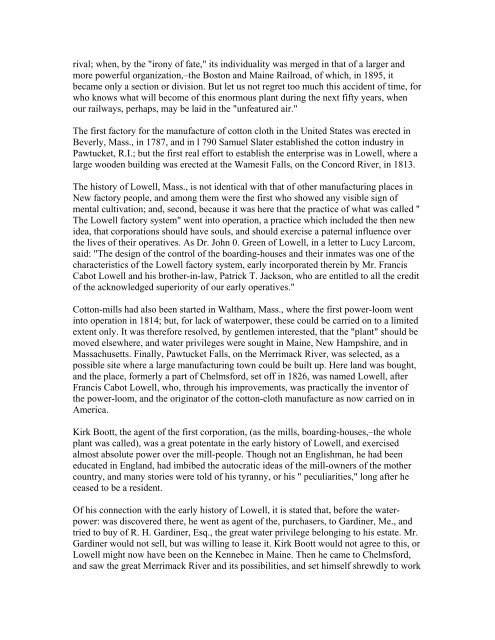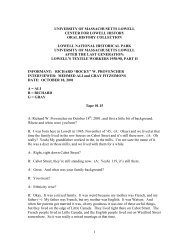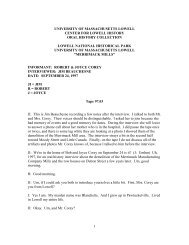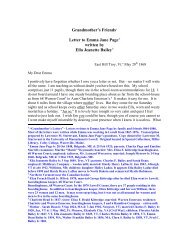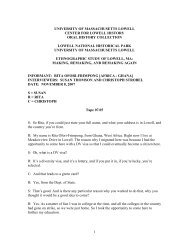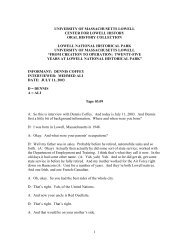LOOM AND SPINDLE OR Life Among the Early Mill Girls WITH A ...
LOOM AND SPINDLE OR Life Among the Early Mill Girls WITH A ...
LOOM AND SPINDLE OR Life Among the Early Mill Girls WITH A ...
You also want an ePaper? Increase the reach of your titles
YUMPU automatically turns print PDFs into web optimized ePapers that Google loves.
ival; when, by <strong>the</strong> "irony of fate," its individuality was merged in that of a larger and<br />
more powerful organization,–<strong>the</strong> Boston and Maine Railroad, of which, in 1895, it<br />
became only a section or division. But let us not regret too much this accident of time, for<br />
who knows what will become of this enormous plant during <strong>the</strong> next fifty years, when<br />
our railways, perhaps, may be laid in <strong>the</strong> "unfeatured air."<br />
The first factory for <strong>the</strong> manufacture of cotton cloth in <strong>the</strong> United States was erected in<br />
Beverly, Mass., in 1787, and in l 790 Samuel Slater established <strong>the</strong> cotton industry in<br />
Pawtucket, R.I.; but <strong>the</strong> first real effort to establish <strong>the</strong> enterprise was in Lowell, where a<br />
large wooden building was erected at <strong>the</strong> Wamesit Falls, on <strong>the</strong> Concord River, in 1813.<br />
The history of Lowell, Mass., is not identical with that of o<strong>the</strong>r manufacturing places in<br />
New factory people, and among <strong>the</strong>m were <strong>the</strong> first who showed any visible sign of<br />
mental cultivation; and, second, because it was here that <strong>the</strong> practice of what was called "<br />
The Lowell factory system" went into operation, a practice which included <strong>the</strong> <strong>the</strong>n new<br />
idea, that corporations should have souls, and should exercise a paternal influence over<br />
<strong>the</strong> lives of <strong>the</strong>ir operatives. As Dr. John 0. Green of Lowell, in a letter to Lucy Larcom,<br />
said: "The design of <strong>the</strong> control of <strong>the</strong> boarding-houses and <strong>the</strong>ir inmates was one of <strong>the</strong><br />
characteristics of <strong>the</strong> Lowell factory system, early incorporated <strong>the</strong>rein by Mr. Francis<br />
Cabot Lowell and his bro<strong>the</strong>r-in-law, Patrick T. Jackson, who are entitled to all <strong>the</strong> credit<br />
of <strong>the</strong> acknowledged superiority of our early operatives."<br />
Cotton-mills had also been started in Waltham, Mass., where <strong>the</strong> first power-loom went<br />
into operation in 1814; but, for lack of waterpower, <strong>the</strong>se could be carried on to a limited<br />
extent only. It was <strong>the</strong>refore resolved, by gentlemen interested, that <strong>the</strong> "plant" should be<br />
moved elsewhere, and water privileges were sought in Maine, New Hampshire, and in<br />
Massachusetts. Finally, Pawtucket Falls, on <strong>the</strong> Merrimack River, was selected, as a<br />
possible site where a large manufacturing town could be built up. Here land was bought,<br />
and <strong>the</strong> place, formerly a part of Chelmsford, set off in 1826, was named Lowell, after<br />
Francis Cabot Lowell, who, through his improvements, was practically <strong>the</strong> inventor of<br />
<strong>the</strong> power-loom, and <strong>the</strong> originator of <strong>the</strong> cotton-cloth manufacture as now carried on in<br />
America.<br />
Kirk Boott, <strong>the</strong> agent of <strong>the</strong> first corporation, (as <strong>the</strong> mills, boarding-houses,–<strong>the</strong> whole<br />
plant was called), was a great potentate in <strong>the</strong> early history of Lowell, and exercised<br />
almost absolute power over <strong>the</strong> mill-people. Though not an Englishman, he had been<br />
educated in England, had imbibed <strong>the</strong> autocratic ideas of <strong>the</strong> mill-owners of <strong>the</strong> mo<strong>the</strong>r<br />
country, and many stories were told of his tyranny, or his " peculiarities," long after he<br />
ceased to be a resident.<br />
Of his connection with <strong>the</strong> early history of Lowell, it is stated that, before <strong>the</strong> waterpower:<br />
was discovered <strong>the</strong>re, he went as agent of <strong>the</strong>, purchasers, to Gardiner, Me., and<br />
tried to buy of R. H. Gardiner, Esq., <strong>the</strong> great water privilege belonging to his estate. Mr.<br />
Gardiner would not sell, but was willing to lease it. Kirk Boott would not agree to this, or<br />
Lowell might now have been on <strong>the</strong> Kennebec in Maine. Then he came to Chelmsford,<br />
and saw <strong>the</strong> great Merrimack River and its possibilities, and set himself shrewdly to work


